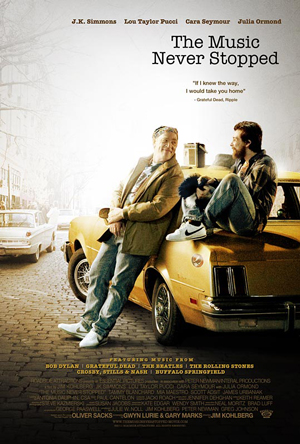Movie Review: The Music Never Stopped
- Details
- Category: New Series and Movie Reviews
- Published: Wednesday, 16 March 2011 07:37
- Written by Lupe Haas
 A young music-loving father is teaching his son all about his favorite music. With each melody comes the artist, composer, and where he was and what he was doing when he first heard the song. Like a game, young Gabriel knows all about his father’s passion, but when he grows up and develops a musical taste of his own, father and son no longer see eye to eye. One night, Gabriel (Lou Taylor Pucci) and his father (J.K. Simmons) have a terrible row and as Gabriel is storming out of the house his father yells after him, “And never come back again!” It is now twenty years later and Henry has yet to see his boy.
A young music-loving father is teaching his son all about his favorite music. With each melody comes the artist, composer, and where he was and what he was doing when he first heard the song. Like a game, young Gabriel knows all about his father’s passion, but when he grows up and develops a musical taste of his own, father and son no longer see eye to eye. One night, Gabriel (Lou Taylor Pucci) and his father (J.K. Simmons) have a terrible row and as Gabriel is storming out of the house his father yells after him, “And never come back again!” It is now twenty years later and Henry has yet to see his boy.Flash forward to the 80’s and Henry is sitting in his living room listening to his precious music. His wife (Cara Seymour) is glaring at him for not answering the telephone. As Henry continues to be transfixed in song, we see Helen’s face change from frustration to grief. Her sorrow is so profound that it gets Henry’s attention. Gabriel has been found.
The next scene takes place in a hospital. While Gabriel has been living on the streets, a slow growing tumor has been invading his brain. With its removal, Gabriel has lost a big portion of his memory and the ability to form new ones. Henry is devastated. He finally has his son back and he can’t even remember the last thing he said.
When Henry is forced into early retirement, Helen decides to get a job. This means that Henry can no longer avoid visiting his son at the hospital. One of them has to be there. Henry is in torment. He really wants to connect with his son but he can’t stand seeing him in his current state. So after he resigns himself to the painful duty of spending time with Gabriel, Henry begins to notice certain promising behaviors. These behaviors start Henry doing research on his own and this him to Diane Daley (Julia Ormond). Diane Daley is a musical therapist. In her research she is developing protocols to reach different parts of the brain through music. She agrees to meet Gabriel and with their meetings she discovers something wonderful, Gabriel has memories that have survived.
This sounds like a hokey premise for a movie, but The Music Never Stopped is based on a true story. When a song released between 1958 through 1970 was played, especially The Beatles, Dylan or the Grateful Dead, Gabriel would light up, become engaged, and recall memories from that period. In order to understand his son and his music more Henry trades in his beloved vinyl and exchanges them for albums from Gabriel’s era. As Gabriel becomes radiant and starts to share with his father what the music means and where he was when he heard it, Henry is now the pupil and Gabriel is the teacher. The scenes between J.K Simmons and Lou Taylor Pucci are magical.
Through Gabriel’s recollections, Henry is convicted and shamed by the mistakes that he made as a father. But now that he has a chance to know his son again he is pouring his entire self into the process. The psychological part of the story is interesting but it is the father-son dynamic that really makes this film. Their scenes are so moving that when you add in the music, they become unforgettable. And that is what makes this movie special, it speaks to the power of music and love.
Melanie Wilson
Visit her blog at LAMelbox.blogspot.com